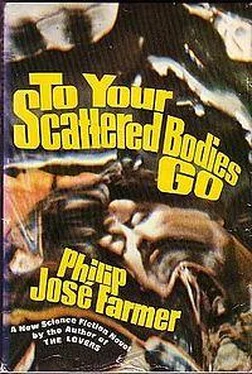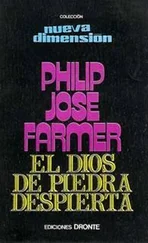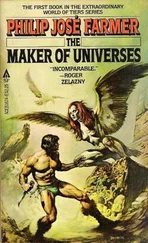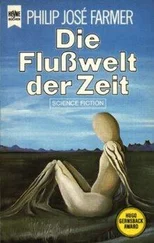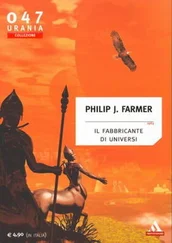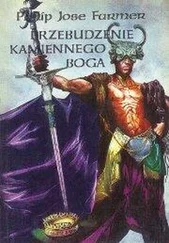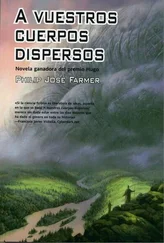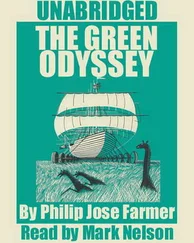"The interceptors failed," Ruach said. "The scanner blew them up before they even got close."
Burton thought he had a lot to learn about post-1890, but now was not the time to talk about it. "I suggest we go up into the hills," he said. "We should learn what type of vegetation grows there and if it can be useful. Also, if there is any flint we can work into weapons. This Old Stone Age fellow must be familiar with stone working. He can show us how." They walked across the mile-broad plain and into the hills. On the way, several others joined their group. One was a little girl, about seven years old, with dark blue eyes and a beautiful face. She looked pathetically at Burton, who asked her in twelve languages if any of her parents or relatives were nearby. She replied in a language none of them knew. The linguists among them tried every tongue at their disposal, most of the European speeches and many of the African or Asiatic: Hebrew, Hindustani, Arabic, a Berber dialect, Romany, Turkish, Persian, Latin, Greek, Pushtu.
Frigate, who knew a little Welsh and Gaelic, spoke to her. Her eyes widened, and then she frowned. The words seemed to have a certain familiarity or similarity to her speech, but they were not close enough to be intelligible.
"For all we know," Frigate said, "she could be an ancient Gaul She keeps using the word Gwenafra. Could that be her name?"
"We’ll teach her English," Burton said. "And we’ll call her Gwenafra." He picked up the child in his arms and started to walk with her. She burst into tears, but she made no effort to free herself. The weeping was a release from what must have been almost unbearable tension and a joy at finding a guardian.
Burton bent his neck to place his face against her body. He did not want the others to see the tears in his eyes.
Where the plain met the hills, as if a line had been drawn, the short grass ceased and the thick, coarse Esparto-like grass, waist-high, began. Here, too, the towering pines, red pines and Lodgepole pines, the oaks, the yew, the gnarled giants with scarlet and green leaves, and the bamboo grew thickly. The bamboo consisted of many varieties, from slender stalks only a few feet high to plants over fifty feet high. Many of the trees were overgrown with the vines bearing huge green, red, yellow, and blue flowers.
"Bamboo is the material for spear-shafts," Burton said, "pipes for conducting water, containers, the basic stuff for building houses, furniture, boats, charcoal even for making gunpowder. And the young stalks of some may be good for eating. But we need stone for tools to cut down and shape the wood" They climbed over hills whose height increased as they neared the mountain. After they had walked about two miles as the crow flies, eight miles as the caterpillar crawls, they were stopped by the mountain. This rose in a sheer cliff-face of some blue-black igneous rock on which grew huge patches of a blue-green lichen. There was no way of determining how high it was, but Burton did not think that he was wrong in estimating it as at least 20,000 feet high. As far as they could see up and down the valley, it presented a solid front.
"Have you noticed the complete absence of animal life?" Frigate said.
"Not even an insect." Burton exclaimed. He strode to a pile of broken rock and picked up a fist-sized chunk of greenish stone. "Chert," he said. "If there’s enough, we can make knives, spearheads, adzes, and axes. And with them build houses, boats, and many other things."
"Tools and weapons must be bound to wooden shafts," Frigate said. "What do we use as binding material? "Perhaps human skin," Burton said.
The others looked shocked. Burton gave a strange chirruping laugh, incongruous in so masculine-looking a man. He said, "If we’re forced to kill in self-defense or lucky enough to stumble over a corpse some assassin has been kind enough to prepare for us, we’d be fools not to use what we need. However, if any of you feel self-sacrificing enough to offer your own epidermises for the good of the group, step forward! We’ll remember you in our wills."
"Surely, you’re joking," Alice Hargreaves said. "I can’t say I particularly care for such talk."
Frigate said, "Hang around him, and you’ll hear lots worse," but he did not explain what he meant.
Burton examined the rock along the base of the mountain. The blue-black densely grained stone of the mountain itself was some kind of basalt. But there were pieces of chert scattered on the surface of the earth or sticking out of the surface at the base. These looked as if they might have fallen down from a projection above, so it was possible that the mountain was not a solid mass of basalt. Using a piece of chert, which had a thin edge, he scraped away a patch of the lichenous growth. The stone beneath it seemed to be a greenish dolomite. Apparently the pieces of chert had come from the dolomite, though there was no evidence of decay or fracture of the vein.
The lichen could be Parmelia saxitilis, which also grew on old bones, including skulls, and hence, according to The Doctrine of Signatures, was a cure for epilepsy and a healing salve for wounds.
Hearing stone banging away on stone, he returned to the group. All were standing around the subhuman and the American, who were squatting back to back and working on the chert. Both had knocked out rough handaxes. While the others watched, they produced six more. Then each took a large chert nodule and broke it into two with a hammerstone. Using one piece of the nodule, they began to knock long thin flakes from the outside rim of the nodule. They rotated the nodule and banged away until each had about a dozen blades.
They continued to work, one a type of man who had lived a hundred thousand years or more before Christ, the other the refined end of human evolution, a product of the highest civilization (technologically speaking) of Earth, and, indeed, one of the last men on Earth — if he was to be believed.
Suddenly, Frigate howled, jumped up, and hopped around holding his left thumb. One of his strokes had missed its target. Kazz grinned, exposing huge teeth like tombstones. He got up, too, and walked into the grass with his curious rolling gait. He returned a few minutes later with six bamboo sticks with sharpened ends and several with straight ends. He sat down and worked on one stick until he had split the end and inserted the triangular chipped-down point of an axehead into the split end. This he bound with some long grasses.
Within half an hour, the group was armed with handaxes, spears with bamboo hafts, daggers, and spears with wooden points and with stone tips.
By then Frigate’s hand had quit hurting so much and the bleeding had stopped. Burton asked him how he happened to be so proficient in stone working.
"I was an amateur anthropologist," he said. "A lot of people — a lot relatively speaking — learned how to make tools and weapons from stone as a hobby. Some of us got pretty good at it, though I don’t think any modern ever got as skillful and as swift as a Neolithic specialist. Those guys did it all their lives, you know.
"Also, I just happen to know a lot about working bamboo, too, so I can be of some value to you." They began walking back to the river. They paused a moment on top of a tall hill. The sun was almost directly overhead. They could see for many miles along the river and also across the river. Although they were too far away to make out any figures on the other side of the mile-wide stream, they could see the mushroom-shaped structures there. The terrain on the other side was the same as that on theirs. A toile-wide plain, perhaps two and a half miles of foothills covered with trees. Beyond, the straight-up face of an insurmountable black and bluish-green mountain.
North sad south, the valley ran straight for about ten miles. Then it curved, and the river was lost to sight.
Читать дальше
